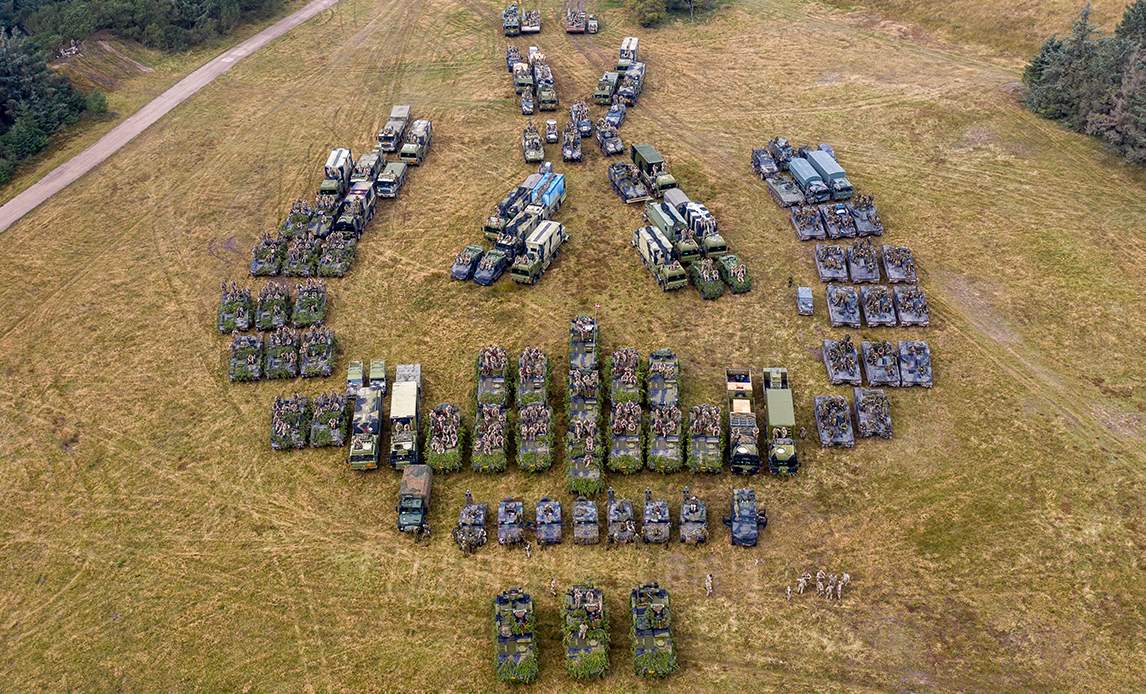Overblik
Uddannelser
Efteruddannelse
Skoler
This module explores the key attributes and the methodology of different planning paradigms in regard to military operations planning. The module will learn students about key planning elements and considerations.

Foto: Kristian Vinther Brøndum
The core empirical and theoretical materiel will be NATO Operations Planning Process and the Operational Level Planning Process on one hand and the methodology and attributes of Military Design Thinking* on the other hand. The module views planning across all levels of war but focuses on operational level processes. The module enhances planning competencies of the military officer in two ways. Firstly, through the provision of a higher-level theoretical understanding of the formal military planning processes and models. Secondly, through the understanding of a constructivist approach to military operations planning in the form of military design thinking.
*“Military design thinking means the capability to understand a current conflict environment from a holistic perspective, to imagine a desired post-conflict environment and to realize it with counter-intuitive military and non-military means” (Phillippe Beaulieau-Brossard, 2017)
The aim of the module is to provide students with a theoretical understanding of key components of military planning to enable them to engage critically in different paradigms for military planning processes and thereby, enable students to analyse evaluate, and provide advice on the planning approach to a military problem within all problem domains.
Students admitted to the Master in Military Studies (MMS) program.
Military Personnel with a bachelor, masters or equivalent degree. MMS students are prioritised.
MMS students who have attended the transitional IMO MMS Military Operations Basic module in 2022 are strongly advised not to attend this flex module as the overlap between the two modules are too significant.
Applications are to reflect whether the student attended IMO MMS Military Operations Basic Module 2022.
Applicants outside the MMS programme are most welcome but their acceptance to the course will be decided upon a screening conversation with the course director.
A minimum of 12 students, incl. minimum 6 MMS students, are accepted to attend.
Upon completion students have acquired the following knowledge, skills and competencies:
Knowledge
Skills
Competencies
The content may include topics such as complexity theory, problem understanding, systems and military design theory, the operating environment, operations design, Operational Art, Center of Gravity, assessment and evaluation, risk, as well as Danish and NATO concepts and doctrines for planning.
The learning activities are mainly conducted in English and Danish and the curriculum is predominantly in English.
The learning activities combine self-study of the curriculum, online activities incl. one group assignment, and one presence module including lectures and group discussions, planning tasks as well a number of learning-exercises which aims to stimulate student´s critical thinking and support a reflexive learning process.
The module is conducted between the 20th of February 2023 and the 05th of May 2023. The course includes a five days presence module, which will be executed in period 17th – 21st April 2023 at Royal Danish Defence College at Svanemøllen Kaserne. The presence module will be executed as long working days.
The work load is set as 5 ECTS-points with each ECTS-point comprising approximately 27.5 hours, i.e. approximately 137.5 hours altogether. Approximately 2 ETCS-points are allocated for the presence module and approximately 2.5 ETCS-points are allocated to curriculum, assignments and various other learning activities. Approximately 0.5 ECTS-point is allocated to the exam.
Students will be required to attend 3 mandatory online sessions in the distance learning period as follow:
Type: Individual oral synopsis based exam. Further guidance for the exam will be promulgated, however, the overarching framework will be:
Language: English or Danish
Grading: Grading in accordance with 7 steps-scale
Censorship: Internal
Deadline: The 05th of May 2023
If the student has not passed and is required to retake the exam. The student is required to re-exam. The deadline for the re-exam is normally two weeks from the time of the previous exam, but the exact deadline is taking the students regular job and workload into consideration. The student has a total of three attempts to pass the module exam.
October 2022
Students attending the MMS and other qualified participants
Min 12 – max 20
Level 7 within the Danish Framework for Life Long Learning
5 ECTS-point
11 Weeks.
Part Time.
Royal Danish Defence College
Ryvangs Allé 1
DK-2100 Copenhagen Ø
Employees under the Ministry of Defence: Free.
Others: 5.000 DKK.
Cdr. Henrik Thrue
Institute for Military Operations, Centre for Joint Operations
Royal Danish Defence College
FIIN: FAK-IMO-VO05
E-mail: heth@fak.dk
Telefon: +45 51 61 49 86
Major
Kenneth Pors Straarup
Forsvarsakademiet
MMS-sektionen
E-mail: kest@fak.dk
FIIN: fak-mms02@mil.dk
Telefon: +45 72 81 70 61